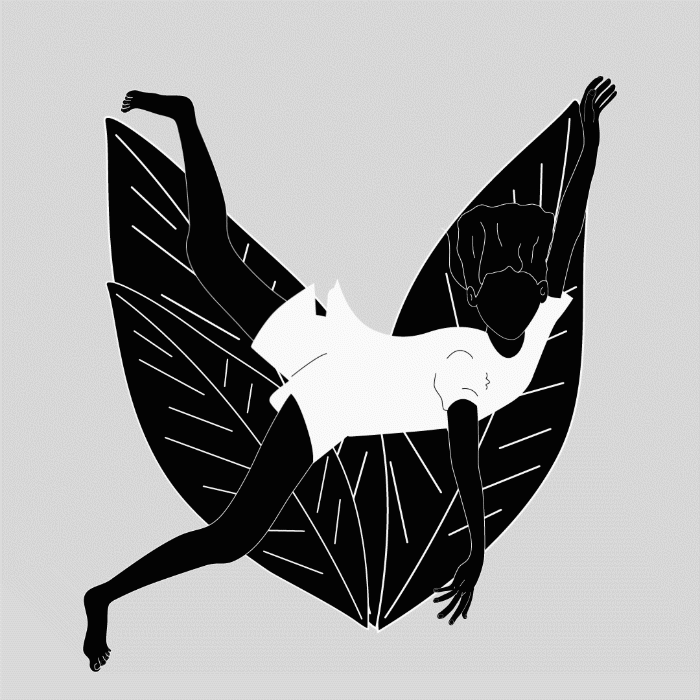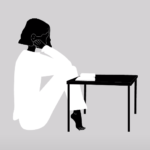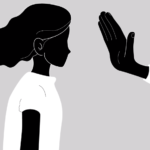HOW CLIMATE CHANGE AFFECT WOMEN?
Countries like Kosovo find it more difficult to cope with the devastating effects of climate change, this is because we have limited potential to prevent and react to the effects of climate change. Since a part of the population, especially the rural population, depends on agriculture, climate change can cause great losses and thus no opportunity for agricultural benefits. Among the many problems that Kosovo faces, in the prism of climate change, the insufficient water supply has the greatest impact.
Ilsutration: Argjira Kukaj

Problems such as extreme weather, rising sea levels, health risks and degradation of ecosystems often occupy the main headlines of the world media but not enough to understand the extent of their impact on our lives. Through paleoclimatology data, we have ideas about the climate that prevailed on our planet even millions of years ago and now we know that our planet has gone through cold and warm periods. These are caused by natural factors such as the intensity of solar radiation, volcanic eruptions; the planet has the ability to recover itself to a certain extent. In this case, the anthropogenic causes of climate change come into play, especially the enormous emission of greenhouse gases generated as a result of our activities such as: burning of fossil fuels, deforestation, use of fertilizers, livestock, etc.
Therefore, thanks to the damage we cause to the environment, we are the ones who face various forms of pollution every day. All of these affects each of us in one way or another, however marginalized groups, in this case women, are the ones most affected by climate change. This is also one of the main concerns of ecofeminism, a relatively new theory among feminist theories. Ecofeminism parallels the destruction of nature with the oppression of women, and argues that both are a consequence of the anthropocentric view, the idea that man is the dominant being. Mirishahe Syla, an expert on gender issues, says that we tend to break down differences into a hierarchy of values – to consider some categories as superior and some as inferior. “So we come back to the idea that one category should dominate another: human beings who dominate and exploit the non-human world, men who dominate women – this is the problem that leads to both, social injustice and the deconstruction of nature,” said Syla.
To clarify the link between climate change and oppression of women, we can take examples, especially of women in developing countries. In Central Africa, where Lake Chad is increasingly drying up, it is women who are forced to walk more and more to collect drinking water, a journey that could endanger their lives. According to UN data, it is women who are most forced to migrate, as many of them lose their lands as a result of the floods. They also have these as their only source of livelihood. Therefore, it is often women who live in poverty, because they are paid less, do not have the right to property, although they are the ones who produce 60-80% of food in developing countries. It has been observed that while increasing the risks associated with climate change, including economic factors, women are at greater risk of domestic violence, emotional stress, and high mortality rates. However, developing countries, such as Kosovo, are most affected. Especially if we consider the potential for agricultural development in Kosovo.
States like Kosovo find it more difficult to cope with the devastating effects of climate change. This is because we have limited opportunities to prevent and react to the effects of climate change. Since a portion of the population, especially rural ones, depend on agriculture, climate change can cause great losses and thus no opportunity for agricultural benefits. Among the many problems facing Kosovo, in the light of climate change, the insufficient water supply has the greatest impact. According to data obtained from the Kosovo Agency of Statistics, in 2018 about 86.31% of the population of Kosovo is supplied with water through the public system managed by Regional Water Companies, while 13.69% of the population did not have access to public water supply service. In Gjilan, last year, residents were left without water as a result of falling water levels in Përlepnica Lake. In some places it has stopped completely and in others the oppression of water has been so low that they have not been able to use it. They had previously used tap water, but as a result of the shortage they were forced to buy it in bottles. Residents have often been forced to supply water from several wells in the village of Pasjan and the Monteith camp. During the winter they are also forced to heat the water in the stove and collect it in the bucket to store it. Jobs that women usually do. According to the information I received from some residents of Vushtrri, they lack drinking water, despite the fact that there is enough water. The problem lies in the villages on the outskirts of the city, as water supply is installed in the city. Most residents have wells and others use other resources to get water.
However, they are endangered by water pollution, as the water of the Sitnica River has such a high level of pollution that it has begun to penetrate wells. The river in which the inhabitants in the pre-war period were also washed, and now it is impossible to pass there because of the odor. Considering these data and the fact that in recent years due to reduced rainfall the amount of groundwater has decreased, women are the ones who spend most of their time managing natural resources and are endangered in various ways. A time that they could otherwise use for personal development and beyond. However, we have a lack of data, which takes into account the gender perspective. These statistics need to be collected because they would help us understand the situation of women and men in our society. The collection of such data aims to inform the public and the media, raise collective awareness, encourage change in society, reduce gender stereotypes, encourage women’s participation in decision-making.
About the author: Andrra Zhjeqi, 22 years old, Prishtina, student in Ecology and Environmental Protection.
This grant is supported by the ‘Civil Society programme for Albania and Kosovo’, financed by the Norwegian Ministry of Foreign Affairs and managed by Kosovar Civil Society Foundation (KCSF) in partnership with Partners Albania for Change and Development (PA).


